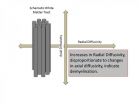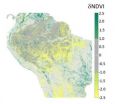(Press-News.org) MINNEAPOLIS - People who have sleep apnea or spend less time in deep sleep may be more likely to have changes in the brain that are associated with dementia, according to a new study published in the December 10, 2014, online issue of Neurology®, the medical journal of the American Academy of Neurology.
The study found that people who don't have as much oxygen in their blood during sleep, which occurs with sleep apnea and conditions such as emphysema, are more likely to have tiny abnormalities in brain tissue, called micro infarcts, than people with higher levels of oxygen in the blood. These abnormalities are associated with the development of dementia.
In addition, people who spent less time in deep sleep, called slow wave sleep, were more likely to have loss of brain cells than people who spent more time in slow wave sleep. Slow wave sleep is important in processing new memories and remembering facts. People tend to spend less time in slow wave sleep as they age. Loss of brain cells is also associated with Alzheimer's disease and dementia.
For the study, 167 Japanese American men had sleep tests conducted in their homes when they were an average age of 84. All were followed until they died an average of six years later, and autopsies were conducted on their brains to look for micro infarcts, loss of brain cells, the plaques and tangles associated with Alzheimer's disease and Lewy bodies found in Lewy body dementia.
The researchers divided the participants into four groups based on the percentage of time spent with lower than normal blood oxygen levels during sleep, with the lowest group spending 13 percent of their time or less with low oxygen levels and the highest group spending 72 to 99 percent of the night with low oxygen levels. Each group had 41 or 42 men. Of the 41 men in the lowest group, four had micro infarcts in the brain, while 14 of the 42 men in the highest group had the abnormalities, making them nearly four times more likely to have brain damage.
Previous studies have also shown a link between sleep stages and dementia. For this study, the participants were again divided into four groups based on the percentage of the night spent in slow wave sleep. Of the 37 men who spent the least time in slow wave sleep, 17 had brain cell loss, compared to seven of the 38 men who spent the most time in slow wave sleep.
The results remained the same after adjusting for factors such as smoking and body mass index and after excluding participants who had died early in the follow-up period and those who had low scores on cognitive tests at the beginning of the study.
"These findings suggest that low blood oxygen levels and reduced slow wave sleep may contribute to the processes that lead to cognitive decline and dementia," said study author Rebecca P. Gelber, MD, DrPH, of the VA Pacific Islands Health Care System and the Pacific Health Research and Education Institute in Honolulu, Hawaii. "More research is needed to determine how slow wave sleep may play a restorative role in brain function and whether preventing low blood oxygen levels may reduce the risk of dementia."
Gelber noted that a previous study showed that use of a continuous positive airway pressure machine (CPAP) for obstructive sleep apnea may improve cognition, even after dementia has developed.
There was no association between the sleep measures and the level of plaques and tangles.
INFORMATION:
The study was supported by the National Institute on Aging, Alzheimer's Association, Hawaii Community Foundation and Department of Veterans Affairs Pacific Islands Health Care System.
To learn more about sleep and brain health, please visit http://www.aan.com/patients.
The American Academy of Neurology, an association of more than 28,000 neurologists and neuroscience professionals, is dedicated to promoting the highest quality patient-centered neurologic care. A neurologist is a doctor with specialized training in diagnosing, treating and managing disorders of the brain and nervous system such as Alzheimer's disease, stroke, migraine, multiple sclerosis, brain injury, Parkinson's disease and epilepsy.
For more information about the American Academy of Neurology, visit http://www.aan.com or find us on Facebook, Twitter, Google+ and YouTube.
A team of researchers from the Cockrell School of Engineering at The University of Texas at Austin and environmental testing firm URS reports that a small subset of natural gas wells are responsible for the majority of methane emissions from two major sources -- liquid unloadings and pneumatic controller equipment -- at natural gas production sites.
With natural gas production in the United States expected to continue to increase during the next few decades, there is a need for a better understanding of methane emissions during natural gas production. The study team ...
An interdisciplinary team of neuroscientists and neurosurgeons from the University of Rochester has used a new imaging technique to show how the human brain heals itself in just a few weeks following surgical removal of a brain tumor.
In a study featured on the cover of the current issue of the journal Science Translational Medicine, the team found that recovery of vision in patients with pituitary tumors is predicted by the integrity of myelin--the insulation that wraps around connections between neurons--in the optic nerves.
"Before the study, we weren't able to ...
Researchers have long debated how and what our ancestors ate. Charles Darwin hypothesized that the hunting of game animals was a defining feature of early hominids, one that was linked with both upright walking and advanced tool use and that isolated these species from their closest relatives (such as ancestors of chimpanzees); modified versions of this hypothesis exist to this day. Other scholars insist that while our ancestors' diets did include meat, it was predominantly scavenged and not hunted. Still others argue that particular plant foods such as roots and tubers ...
NEW YORK, NY (December 10, 2014)--Columbia University Medical Center researchers have devised a way to replace the knee's protective lining, called the meniscus, using a personalized 3D-printed implant, or scaffold, infused with human growth factors that prompt the body to regenerate the lining on its own. The therapy, successfully tested in sheep, could provide the first effective and long-lasting repair of damaged menisci, which occur in millions of Americans each year and can lead to debilitating arthritis. The paper was published today in the online edition of Science ...
A 13-year decline in vegetation in the eastern and southeastern Amazon has been linked to a decade-long rainfall decline in the region, a new NASA-funded study finds.
With global climate models projecting further drying over the Amazon in the future, the potential loss of vegetation and the associated loss of carbon storage may speed up global climate change.
The study was based on a new way to measure the "greenness" of plants and trees using satellites. While one NASA satellite measured up to 25 percent decline in rainfall across two thirds of the Amazon from 2000 ...
NOAA and its partners today released three-dimensional sonar maps and images of an immigrant steamship lost more than 100 years ago in what many consider the worst maritime disaster in San Francisco history.
On Feb. 22, 1901, in a dense morning fog, the SS City of Rio de Janeiro struck jagged rocks near the present site of the Golden Gate Bridge and sank almost immediately, killing 128 of the 210 passengers and crew aboard the ship.
Fishermen in the area, hearing the ship's distress calls, helped rescue 82 survivors, many plucked from makeshift rafts and floating wreckage. ...
Athens, Ga. - The amount of weight a woman gains during pregnancy can be vitally important--especially if she's carrying a boy--according to a study by researchers at the University of Georgia released today in PLOS ONE, an open access peer-reviewed journal published by the Public Library of Science.
Research by associate professor Kristen Navara in the College of Agricultural and Environmental Sciences found that male fetuses are more likely to die if their mothers don't gain enough weight during pregnancy.
"Fetuses are differentially susceptible to inadequate weight ...
Everything you know about crowdfunding is wrong, at least according to researchers at UC Santa Barbara. And that, they add, is good news for scientists. Crowdfunding is the practice of financing a project or venture through contributions from a large number of people, typically via the Internet.
"There's this myth about how crowdfunding is supposed to work," said Jarrett Byrnes, a former postdoctoral associate at UCSB's National Center for Ecological Analysis and Synthesis (NCEAS). "The myth is that going viral is the only way to have a successful crowdfunding campaign. ...
COLUMBIA, Mo. -- Researchers from the University of Missouri School of Medicine have found that drinking alcohol to fall asleep interferes with sleep homeostasis, the body's sleep-regulating mechanism.
Alcohol is known to be a powerful somnogen, or sleep inducer, and approximately 20 percent of the U.S. adult population drinks alcohol to help fall asleep. The researchers, led by Mahesh Thakkar, Ph.D., associate professor and director of research in the MU School of Medicine's Department of Neurology, have studied alcohol's effects on sleep for more than five years. They ...
In light of the film Dinosaur 13, which describes the discovery and loss of the complete Tyrannosaurus rex skeleton known as "Sue" by the Black Hills Institute of Geological Research, the Society of Vertebrate Paleontology reiterates its strong endorsement of the U.S. Federal laws and regulations that protect fossils on public lands, which are fully consistent with the professional standards held by paleontological scientists and with the ethics of the Society.
Most vertebrate fossils are rare, many of them unique. The laws and regulations for collecting fossils on Federal ...





